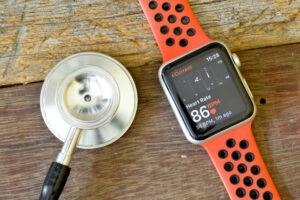What's On This Page?
ToggleToday, we’re diving into how AI (artificial intelligence) and the coolest health gadgets are transforming diagnostics, telehealth, and personal health management.
Let’s start with diagnostics. Imagine you have a lump, or need some imaging for your abdomen, or your knee for example. AI can now quickly analyze your X-rays, MRIs, and pathology slides and catch details that might have slipped past even the most experienced specialist.
For example, Aidoc’s AI helps emergency departments identify pulmonary embolisms or brain hemorrhages in record time, even before a radiologist reviews the scan. If you’re a practitioner and want more information CLICK HERE.
AI has been particularly revolutionary in spotting early-stage breast cancer and lung cancer, conditions where early detection can make a life-saving difference. A study published in The Lancet Digital Health found that AI systems in mammography detected breast cancer with accuracy comparable to human radiologists, with fewer false negatives.
But what’s truly game-changing is personalized healthcare. AI programs can analyze your unique data, think of your complex medical history, genetic details, and even lifestyle factors, to create customized diagnostics. It’s like having a personal Sherlock Holmes dedicated to solving your health puzzles.
Real-world conditions like diabetes, hypertension, or even heart arrhythmias are now more manageable with telehealth. Thanks to remote patient monitoring gadgets like KardiaMobile or the new Apple Watch Series 9, healthcare providers can track metrics such as blood pressure, heart rate, or blood sugar levels in real-time. Imagine catching an irregular heartbeat or an impending hypertensive crisis before it escalates.
Blood Oxygen Feature: Monitoring SpO2
Do you have a heart condition like LEFT VENTRICULAR HYPERTROPHY? If so, you may need health gadgets of some sort to properly track your blood oxygen levels.
What about ASTHMA or another lung disorder that causes you to have dyspnea? Do you have IRON DEFICIENCY anemia or other causes for SHORTNESS OF BREATH? These conditions and many others require health gadgets to track your blood oxygen levels (abbreviated as SpO2). Let’s talk about your best options for this.
The new Apple Watch Series 9 and 10 (and probably future watches too!) NO LONGER has the ability to track Blood Oxygen (SpO2) any longer due to a patent dispute with Masimo and it won’t be resolved until 2028. The older watches still have the feature enabled. Also of interest, Apple watches Series 9 and 10 that are sold outside of the US have the pulse oximetry feature so you can track your SpO2.
It’s on the watch still, you just can’t use it because it’s been disabled from the newer watches so if this feature is critical to your health, don’t trade up yet! On the upside, these newer watches are lighter in weight, and have a brighter screen which is nice for readabilty.

If the SpO2 feature is critical to your health, and you are interested in other watches, here are your best options at the time of this writing (Dec 2024). Some popular health gadgets include:
1. Samsung Galaxy Watch Series
- Samsung Galaxy Watch 4, 5, and 6: These watches feature SpO2 tracking, which can provide insights into your blood oxygen levels during activities or sleep.
2. Garmin Watches
Garmin offers SpO2 monitoring in many of its premium models, targeted at athletes and outdoor enthusiasts:
- Garmin Forerunner Series (e.g., Forerunner 255, 265, 955)
- Garmin Fenix Series (e.g., Fenix 6, Fenix 7)
- Garmin Venu Series (e.g., Venu 2, Venu Sq 2)
- Garmin Epix Series (e.g., Epix Gen 2)
- Garmin Instinct Series
3. Fitbit Devices
Fitbit provides SpO2 tracking on several models and they are very popular and affordable:
- Fitbit Sense and Sense 2
- Fitbit Versa 3 and 4
- Fitbit Charge 5
4. Huawei and Honor Watches
- Huawei Watch GT Series
- Huawei Watch 3 and 4
- Honor Band Series These devices offer continuous SpO2 tracking and detailed metrics.
5. Amazfit Watches
Amazfit smartwatches are known for affordability and feature-rich designs, including SpO2 tracking:
- Amazfit GTR 4, GTS 4, T-Rex 2
- Amazfit Band Series
6. Polar Watches
- Polar Grit X
- Polar Vantage V2 Polar devices also include SpO2 tracking as part of their advanced fitness and health monitoring.
7. Suunto Watches
- Suunto 9 Peak
- Suunto 7 These are designed for outdoor activities and include SpO2 monitoring features.
8. Whoop Strap
While not a watch, the Whoop Strap 4.0 offers continuous blood oxygen monitoring, primarily targeting athletes.
9. Xiaomi Watches
- Mi Band Series (e.g., Mi Band 7, 8)
- Xiaomi Watch S1 Xiaomi devices provide SpO2 tracking at an affordable price.
While these devices are helpful for wellness and fitness tracking, they are not medical-grade devices. Results may vary, and you should consult a doctor for clinical concerns and not rely solely on health gadgets. As one other convenience measure, ensure the smartwatch you choose integrates well with your smartphone for ease, and seamless data tracking.
Glucose Monitoring
Now, for all you proactive health warriors. Non-invasive glucose monitoring is the next big thing. While “Raman spectroscopy-based” gadgets are still in development, devices like the Dexcom G7 and Abbott’s FreeStyle Libre 3 are leading the charge in making diabetes management easier than ever. No more fingersticks, just continuous data delivered straight to your smartphone!
And it’s not just for diabetes. Health wearables (ie health gadgets) like FITBIT now sync with AI-powered apps that analyze sleep, activity, and even stress levels. For example, if you’re recovering from long COVID or managing chronic fatigue syndrome, these gadgets can identify patterns and suggest tweaks to optimize your energy levels.
AI also helps tailor treatment plans for complex conditions like irritable bowel syndrome (IBS). For instance, apps like MyGIHealth analyze symptoms and dietary habits to recommend personalized lifestyle changes, all while tracking improvements over time.
Summary about Health Gadgets
What does all this mean for you? It means healthcare is becoming more accessible, accurate, and personalized than ever. Diagnosing early-stage cancer, managing diabetes without needles, or preventing a heart attack with a smartwatch, it’s not just possible it is happening.
But here’s the thing, while AI and gadgets are incredible tools, they’re not replacements for the human touch in healthcare. Your doctor, pharmacist (hello, that’s me!), and other providers are still your most valuable resources. Until next time, keep your health in check and your gadgets close!

Suzy Cohen, has been a licensed pharmacist for over 30 years and believes the best approach to chronic illness is a combination of natural medicine and conventional. She founded her own dietary supplement company specializing in custom-formulas, some of which have patents. With a special focus on functional medicine, thyroid health and drug nutrient depletion, Suzy is the author of several related books including Thyroid Healthy, Drug Muggers, Diabetes Without Drugs, and a nationally syndicated column.



